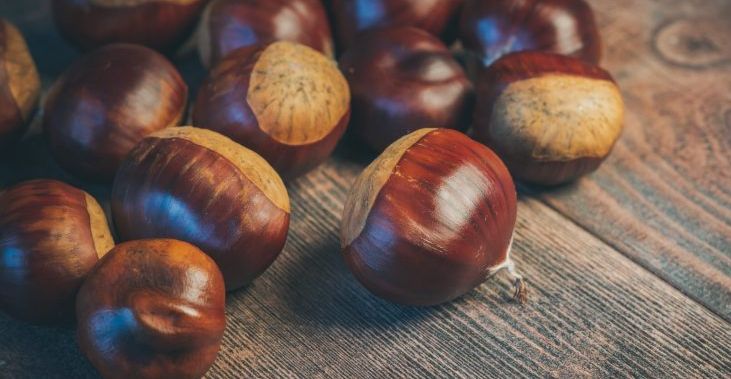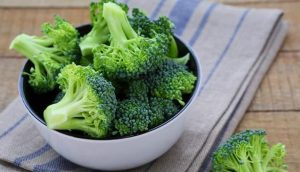Chestnuts are many people’s favourite snack during the autumn and winter seasons. They deserve to be so with their unique taste both roasted and raw. But, their unique taste is not the only reason why many people prefer them over other snacks.
The health benefits of chestnuts ( that started being known by more and more people in recent years) are also another strong factor that makes many people choose chestnuts as their favourite snacks.
In this article, we will investigate the (evidence-based) health benefits of chestnuts.
While we will focus mainly on chestnuts health benefits, we will also touch upon other details, such as nutrition facts, potential side effects and daily recommended intake of chestnuts.
Since we provide various details on chestnuts, this article will be quite informative and comprehensive. And, that unavoidably makes this article deep and long.
So we have added a table of contents below. In case you don’t want to read the whole article you can skip ahead to the passage that interests you most by clicking the headings presented in the table:
Nutrition Facts of Chestnuts
Here is the section where we are going to discover the nutrients that chestnuts contain. These nutrients can give us a clue about how healthy chestnuts can be for the human body.
We prepared a nutrition facts label for you that illustrates the most prominent nutrients present in chestnuts.
Although not mentioned in the label, chestnuts also contain calcium, iron, selenium and zinc in small quantities.
Note: this nutrition facts label prepared with the information provided by nutritionvalue.org
| Nutrition | 100 Gr | % Daily Value |
|---|---|---|
| Vitamin B6 | 0.497 mg | 38 % |
| Vitamin C | 26.0 mg | 29 % |
| Vitamin E | 0.50 mg | 2 % |
| Vitamin K | 7.8 mcg | 6 % |
| Folate | 70.00 mcg | |
| Copper, Cu | 0.507 mg | 56 % |
| Magnesium, Mg | 33.00 mg | 8 % |
| Phosphorus, P | 107.00 mg | 15 % |
| Potassium, K | 592.00 mg | 13 % |
| Protein | 3.17 g | 6 % |
| Carbohydrate | 52.96 g | 19 % |
| Fibre | 5.1 g | 18 % |
Moreover, chestnuts also contain a decent amount of Niacin, Riboflavin and Thiamin.
Health Benefits of Chestnuts
Now that we have examined the nutrients found in chestnuts, we can now focus on our main topic which is the health benefit of chestnuts.
Here are the 10 evidence-based health benefits of chestnuts.
1- May Improve Brain Functions
The B vitamins present in chestnut is the main reason why these nuts are beneficial for brain health.
B vitamins are significant for people from all age groups, but they in particular play a crucial role in brain health in children (1).
Medical experts underline the increased risk of cognitive disorders such as memory loss and Alzheimer’s due to deficiency of the B vitamins (2).
For instance, thiamin, in other words, vitamin B1.
Scientific studies suggest that thiamin deficiency can cause fatal brain disorder such as delirium and Wernicke’s encephalopathy (3).
Similar studies and scientific reports also demonstrate the importance of vitamin B6 and underline the cognitive problems that can occur due to a deficiency of this vitamin(4), (5).
The human body doesn’t store B vitamins. Therefore, they have to be taken steadily with foods or supplements.
The good news, by the way, is that chestnuts provide your body with many B vitamins such as vitamin B6, folate, Niacin, Riboflavin and Thiamin.
Summary: Chestnuts are loaded with B vitamins which are necessary for brain health. Especially vitamin B6 is quite high in chestnuts. To be more precise; 100 gr chestnuts meet approximately 40% of daily vitamin B6 needs.
2- May Improve Bones
If you are above a certain age, then you have another reason to eat more chestnuts. This is because these nuts contain various bone-building minerals.
You may have thought about calcium when the subject is bone health. However, chestnuts’ bone-supporting properties stem from their magnesium, phosphorus, potassium and copper content rather than calcium.
Chestnuts are poor in calcium and don’t contain vitamin D.
Yes, calcium and vitamin D are the two most important nutrients for bone health. Yet, adequate intake of protein, magnesium, phosphorus and potassium are also essential for healthy bones (6), (7).
Only 10 kernels of chestnut can meet approximately:
- 10% of daily magnesium needs
- 15% of daily phosphorus needs
- 15% of daily potassium needs.
In addition to them, chestnuts are exceptionally high in copper. More specifically;100 gr contains 0.507 mg copper which equates to 55% of daily needs.
Recent studies reveal the significant role of copper in maintaining bone health (8), (9).
Summary: Chestnuts are a decent source of various bone-strengthening minerals. In light of this, we can say that one of the health benefits of chestnuts is to support bone health.
3- Ideal For Celiac Patients
Gluten-containing foods can damage the small intestine in gluten-sensitive patients. For this reason, gluten patients have to avoid eating them. Chestnuts don’t contain gluten and possess many essential nutrients. So, they can be an ideal snack for celiac patients.
Celiac patients, most of the time, avoid gluten-containing foods. As a result of this, there can be certain vitamin and mineral deficiencies in their bodies.
Copper, iron and zinc are the nutrients that many celiac patients lack due to their diet (10).
As chestnuts are quite rich in copper, they can lower the risk of copper deficiency. Furthermore, these nuts also provide some iron and zinc.
Yet, arguably the best news for celiac patients is that chestnut flour can be used for baking products such as bread, and brownies – types of foods that celiac patients have to avoid (11),(12).
Summary: Chestnuts can provide certain nutrients that celiac patients may lack. Additionally, chestnut flour can be used in baking products as a replacement for gluten-containing wheat.
4- May Improve Digestion
Here is another health benefit of eating chestnuts. These tasty nuts can improve digestion thanks to their high fibre content.
The question to ask is “what does fibre do for the digestive system?”
With the simplest explanation, fibre enables the digestive tract to work efficiently by improving bowel movements (13), (14).
As given in the table above, 100 gr chestnuts can meet almost 20% of your daily fibre needs.
Fibre is essential for the digestive system overall. But, this nutrient is most famous for its ability to prevent or relieve constipation (13).
Furthermore, the findings of a test-tube study demonstrated that chestnut extract has a protective effect on probiotics, which are live beneficial bacteria in the human body (15).
Summary: It appears eating chestnuts can help the digestive system to work smoothly.
5- Support The Immune System
Chestnuts contain some nutrients and compounds that are known to boost the immune system.
Nuts, in general, are not rich in vitamin C. But, chestnuts are utterly an exception in this context.
They contain a significant amount of immune-boosting vitamin C. To be more precise; 100 grams of chestnut can supply about 30% of the daily vitamin C needs of your body.
( Note: boiling or roasting chestnuts can significantly decrease the vitamin C level )
According to the Harvard School of Public Health; vitamin C is a critical vitamin for the growth and function of immune cells (16).
However, vitamin C is not the only nutrient that makes chestnuts an immune-boosting snack.
Antioxidants, copper and vitamin B6, all available in chestnuts, can also support the immune cells (17),(18).
Summary: Sleep quality, exercise and stress management are rather important to keep the immune system strong. Consolidating these crucial factors with nutrient-dense foods – such as chestnuts – will help your immune system to work smoothly.
6- May Improve Heart Health
Eating chestnuts might be beneficial for your heart as well, especially if you are above a certain age.
One of the most important rules for protecting the heart is to reduce the risk of certain medical conditions that threaten heart health.
For instance; high blood pressure and high cholesterol are two strong risk factors for heart disease.
High blood pressure can lead people to heart attack and stroke, if not managed properly.
The good news is chestnuts can help manage high blood pressure by providing potassium.
How so? In two ways.
Firstly; potassium helps the body to get rid of excess sodium through urine. And, secondly, it helps to ease tension in the blood walls, thus lowering blood pressure (19).
The American Health Association; define potassium as one of the most important nutrients in lowering blood pressure (19).
As for the high cholesterol level; the high fibre level of chestnuts help to reduce bad cholesterol level (20).
Summary: Chestnuts can help you control medical conditions (hypertension-high cholesterol) that can lead to heart disorders. Eat-in moderation to reap the benefits.
7- Chestnuts Potentially Ideal For Diabetes
We have thus far said that chestnuts can help reduce cholesterol levels, plus, aid digestion with their high fibre level. Here is another medical issue that chestnut’s high fibre level can help with.
According to Mayo Clinic; fibre can slow the absorption of sugar thus enabling people to better manage their diabetes (13).
What’s more; consuming a sufficient amount of soluble fibre can lower the risk of developing type-2 diabetes (13).
It bears repeating; 100 gr chestnuts contain 5.1 gr fibre. And, that equals approximately 20% of daily fibre needs.
Summary: Eating chestnuts may enable you to better manage your blood sugar levels thanks to their fibre content. We, nevertheless, STRONGLY recommend you to speak with your doctor/dietitian as to chestnut consumption. In doing so, you can avoid potential diabetes complications.
8- May Protect the Skin
The vitamin C and niacin content of chestnuts are making these nuts potentially beneficial for skin health.
As many of us know vitamin C is a powerful antioxidant and antioxidants protect the skin against free radicals.
So what are free radicals’ relation to skin health?
Free radicals damage the skin by breaking down the skin’s collagen production. Collagen has a vital role in strengthening the skin and helping the skin protect its elasticity.
When collagen production decreases for any reason – for instance, due to free radicals – skin problems like skin sagging, dark spots and wrinkles can occur.
As mentioned above, chestnuts contain a handsome amount of vitamin C which can aid in neutralising free radicals.
As for niacin ( vitamin B3), this chemical compound is known to protect the skin against the harmful effects of the sun’s Uv rays. Related to this, there is some evidence to suggest consumption of niacin (nicotinamide) may decrease the risk of non-melanoma skin cancer (21), (22).
Summary; Regular consumption of chestnuts can support your skin health by providing vitamin C and niacin (vitamin B3).
9- Chestnuts May Aid Weight-loss
Eating chestnuts in moderation may help you lose weight or at least prevent further weight gain.
On the positive side; chestnuts have the lowest rate of both calorie and fat among the nuts (23).
This piece of information makes chestnuts potentially the most ideal nuts when it comes to weight loss.
Moreover, as mentioned repeatedly above, chestnuts are extremely rich in dietary fibre.
Fibre is known to keep people full for long hours thus preventing them from eating more calories (24).
On the flip side, chestnuts’ relatively high carbohydrates amount pose questions about their effectiveness in weight loss.
Summary: They may be a bit high in carbohydrates among other nuts. Nevertheless, their high fibre level and extremely low-calorie and fat content force us to say that these nuts can aid weight loss.
10 – Chestnuts Benefits for Hair
Micronutrients like vitamin C, vitamin B and copper – all present in chestnuts – explain why chestnuts are beneficial for hair.
According to Healthline; Vitamin C and B vitamins are important for hair growth (25).
The good news is chestnuts can provide your body with a great amount of vitamin C and B vitamins that support hair growth and thickness.
In addition to hair growth and hair thickness, chestnuts can also help hair to preserve its original colour thanks to its high copper levels.
According to medical experts; copper has a vital role in melanin formation, which gives the hair its original colour (26).
When copper lacks in the body it can negatively affect melanin production and may result in premature white hair.
Summary: Chestnuts are generous in providing hair-protecting nutrients like vitamin C, vitamin B, and copper.
How Many Chestnuts Should You Eat A Day?
As we all know too much of a good thing is bad. As such, it is important to know the daily chestnut consumption.
We are all different from each other in terms of age, gender, height, weight, health status, etc. Therefore, it is difficult to determine the right amount of chestnut consumption that suits everyone.
To put it simply, how much is too much when it comes to chestnut consumption shows alteration based on the individual.
The second problem is there is no study or research that can give us a clue as to the safe amount of chestnut consumption.
Despite all, considering that chestnuts are high in carbohydrates and fibre, it is wise not to eat more than 6 chestnuts a day.
Chestnuts’ Potential Side Effects
Even though it is rare chestnut consumption may cause some complications in some people. In this section, we will look at the potential side effects of eating chestnuts.
1- Chestnuts Allergy
First of all, it is important to indicate that chestnut allergy is very rare. According to medical experts; when a person allergic to chestnuts eats chestnuts; symptoms like wheezing, throat swelling, breathing difficulties and a fall in blood pressure can occur (27). These complications can even be fatal sometimes.
Therefore, if you have a nut allergy, speak with your doctors as to chestnut consumption.
2- Indigestion- Diarrhoea
When consumed in large amounts, digestive problems like diarrhoea and indigestion are more likely to occur.
3- Diabetes
We said above that chestnuts can be beneficial for people with diabetes thanks to their high fibre levels. However, when consumed in large quantities they can cause show reverse effects due to their high carbohydrate level.
If you have diabetes, discuss with your doctor the safe amount of chestnut consumption.
It appears that chestnuts are safe for MOST PEOPLE when eaten in moderation.
Raw and Cooked Chestnuts / Nutritional Differences
In fact, there are no too big nutritional differences between raw and cooked chestnuts.
According to WebMD; chestnuts can lose some of their vitamin C when either boiled or roasted. As such; if you eat chestnuts necessarily for their vitamin C content: you should consume them raw.
Once again according to WebMD; gallic acid and ellagic acid, two antioxidants present in chestnuts, increase in concentration when these nuts are cooked.
Last but not least; roasted chestnuts contain more calories than raw and boiled chestnuts.
Takeaway
In this long, comprehensive and informative article we have discussed the evidence-based health benefit of chestnuts.
It appears these tasty nuts can contribute to your health in many ways.
Nevertheless, as we always state ” whatever you drink or eat, make sure you consume in moderation”. In this way, you can reap the full benefits.
Tarkan is an experienced health writer ( currently more than 600 articles ) and also the founder of this website namely www.neededforhealth.com. His expertise in health stems from in-depth medical research and knowledge which he obtained over the course of many years.
Tarkan enjoys sharing factual knowledge on health, psychology and nutrition. He always aims to deliver evidence-based recommendations, provide links to related scientific studies.





